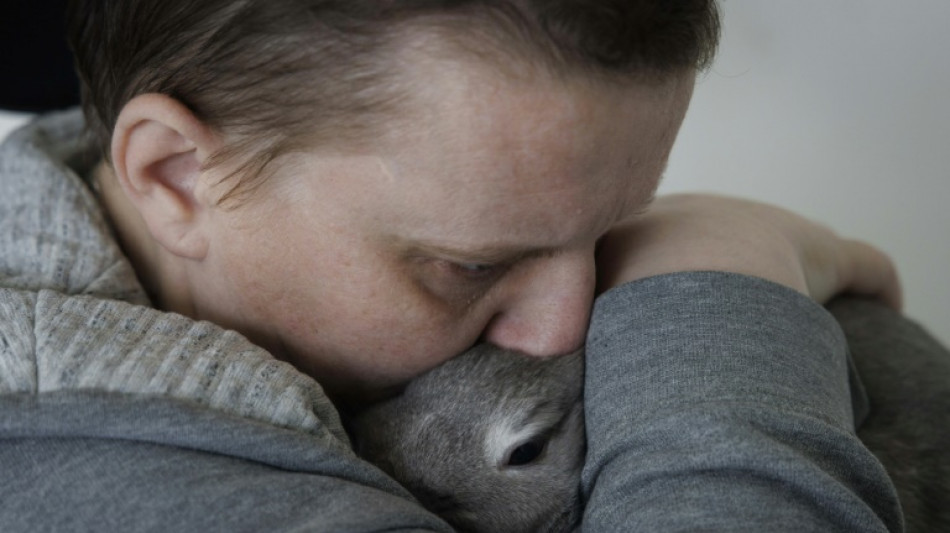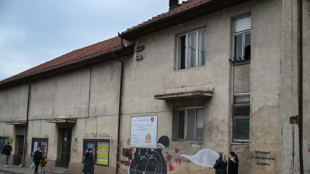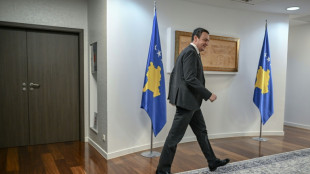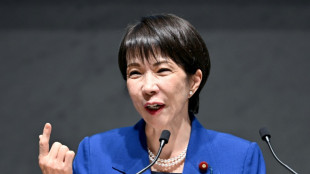
-
 Cricket Australia boss says short Tests 'bad for business' after MCG carnage
Cricket Australia boss says short Tests 'bad for business' after MCG carnage
-
Russia lashes out at Zelensky ahead of new Trump talks on Ukraine plan

-
 Six Australia wickets fall as England fight back in 4th Ashes Test
Six Australia wickets fall as England fight back in 4th Ashes Test
-
Man Utd made to 'suffer' for Newcastle win, says Amorim

-
 Morocco made to wait for Cup of Nations knockout place after Egypt advance
Morocco made to wait for Cup of Nations knockout place after Egypt advance
-
Key NFL week has playoff spots, byes and seeds at stake

-
 Morocco forced to wait for AFCON knockout place after Mali draw
Morocco forced to wait for AFCON knockout place after Mali draw
-
Dorgu delivers winner for depleted Man Utd against Newcastle

-
 US stocks edge lower from records as precious metals surge
US stocks edge lower from records as precious metals surge
-
Somalia denounces Israeli recognition of Somaliland

-
 The Cure guitarist and keyboard player Perry Bamonte dies aged 65
The Cure guitarist and keyboard player Perry Bamonte dies aged 65
-
Draper to miss Australian Open

-
 Police arrest suspect after man stabs 3 women in Paris metro
Police arrest suspect after man stabs 3 women in Paris metro
-
Former Montpellier coach Gasset dies at 72

-
 Trump's Christmas gospel: bombs, blessings and blame
Trump's Christmas gospel: bombs, blessings and blame
-
Russia lashes out at Zelensky ahead of new Trump meeting on Ukraine plan

-
 Salah helps Egypt beat South Africa and book last-16 place
Salah helps Egypt beat South Africa and book last-16 place
-
Australia's Ikitau facing lengthy lay-off after shoulder injury

-
 Another 1,100 refugees cross into Mauritania from Mali: UN
Another 1,100 refugees cross into Mauritania from Mali: UN
-
Guardiola proud of Man City players' response to weighty issues

-
 Deadly blast hits mosque in Alawite area of Syria's Homs
Deadly blast hits mosque in Alawite area of Syria's Homs
-
The Jukebox Man on song as Redknapp records 'dream' King George win

-
 Liverpool boss Slot says Ekitike reaping rewards for greater physicality
Liverpool boss Slot says Ekitike reaping rewards for greater physicality
-
Judge jails ex-Malaysian PM Najib for 15 more years after new graft conviction

-
 Musona rescues Zimbabwe in AFCON draw with Angola
Musona rescues Zimbabwe in AFCON draw with Angola
-
Zelensky to meet Trump in Florida on Sunday

-
 'Personality' the key for Celtic boss Nancy when it comes to new signings
'Personality' the key for Celtic boss Nancy when it comes to new signings
-
Arteta eager to avoid repeat of Rice red card against Brighton

-
 Nigeria signals more strikes likely in 'joint' US operations
Nigeria signals more strikes likely in 'joint' US operations
-
Malaysia's former PM Najib convicted in 1MDB graft trial

-
 Elusive wild cat feared extinct rediscovered in Thailand
Elusive wild cat feared extinct rediscovered in Thailand
-
Japan govt approves record budget, including for defence

-
 Seoul to ease access to North Korean newspaper
Seoul to ease access to North Korean newspaper
-
History-maker Tongue wants more of the same from England attack

-
 Australia lead England by 46 after 20 wickets fall on crazy day at MCG
Australia lead England by 46 after 20 wickets fall on crazy day at MCG
-
Asia markets edge up as precious metals surge

-
 Twenty wickets fall on day one as Australia gain edge in 4th Ashes Test
Twenty wickets fall on day one as Australia gain edge in 4th Ashes Test
-
'No winner': Kosovo snap poll unlikely to end damaging deadlock

-
 Culture being strangled by Kosovo's political crisis
Culture being strangled by Kosovo's political crisis
-
Main contenders in Kosovo's snap election

-
 Australia all out for 152 as England take charge of 4th Ashes Test
Australia all out for 152 as England take charge of 4th Ashes Test
-
Boys recount 'torment' at hands of armed rebels in DR Congo

-
 Inside Chernobyl, Ukraine scrambles to repair radiation shield
Inside Chernobyl, Ukraine scrambles to repair radiation shield
-
Bondi victims honoured as Sydney-Hobart race sets sail

-
 North Korea's Kim orders factories to make more missiles in 2026
North Korea's Kim orders factories to make more missiles in 2026
-
Palladino's Atalanta on the up as Serie A leaders Inter visit

-
 Hooked on the claw: how crane games conquered Japan's arcades
Hooked on the claw: how crane games conquered Japan's arcades
-
Shanghai's elderly waltz back to the past at lunchtime dance halls

-
 Japan govt approves record 122 trillion yen budget
Japan govt approves record 122 trillion yen budget
-
US launches Christmas Day strikes on IS targets in Nigeria


Euthanasia, a final journey from France to Belgium
Born hemiplegic, nearly blind, 43-year-old Lydie Imhoff was gradually losing the use of her limbs. Last year, she made the decision to travel from her native France to Belgium to undergo euthanasia -- for "fear of living in a dead body."
An AFP team first joined Lydie in March 2023, to meet with a psychiatrist in Brussels who gave a green light for her to undergo the procedure, made legal in Belgium two decades ago but still outlawed in France.
They travelled with her again early this year, on a final journey from the apartment in eastern France where she lived alone with her pet rabbit, to Brussels where her ashes have now been scattered.
Tuesday, January 30 - Besancon, France
Lydie's apartment lies almost empty, the light of the setting sun glinting at the bay windows. Huddled in her wheelchair, she sighs as her rabbit, Lucky, shuffles around the room. The sound of her breathing echoes through the empty space.
"On the one hand I can't wait for release. On the other I feel guilty for leaving behind the people I love. But at the end of the day, it's a choice I've made," she tells AFP.
The mood is solemn, but that doesn't stop Lydie cracking jokes.
"Don't let me forget to put the keys through the letterbox -- or they'll murder me for it!"
Wednesday, January 31 - departure at dawn
It's still dark outside when Denis Rousseaux and his wife Marie-Josee pull up outside Lydie's home in a rented van. Both retired, the former anaesthetist and nurse have been helping her since 2023 with the process of seeking euthanasia abroad.
Cut off from her family, Lydie relies wholly on the support of a handful of friends and volunteers like these.
Settling on the backseat, she snuggles against Marie-Josee and pulls up her blanket, still flecked with the fur of her rabbit -- which was taken in by a foster family the day before she left.
Once the wheelchair is loaded in, Denis Rousseaux starts the engine. It's the first time the couple have escorted someone to Belgium.
"It's first and foremost a humanitarian gesture," he says, his eyes locked on the road ahead. "The political aspect comes second."
Wednesday, January 31 - lunch at the border
They break the journey in Longwy, a French town just short of the border, where they meet Claudette Pierret, a right-to-die activist who first connected Lydie with Yves de Locht, the Belgian doctor who will perform the procedure.
A table is laid for them -- "It's like a birthday lunch!" quips Lydie, before turning serious.
"I just hope once I'm up there, that I'll be in peace, that I can get some rest," she says.
"I'm tired. I'm tired of every day being a battle -- against my illness, against my disabilities, against everything."
"I know I joke around, I shoot the breeze all day long -- but there you have it."
"What you see here," she says, pointing at her face, "that's not what's really underneath."
After the meal is over, they say goodbye at the front gate. The van sets off again, bound for Brussels. Lydie's day is not over yet. Arrived at the hospital, she settles into a large room, decorated with a seaside theme.
"OK then -- what's the last meal on death row tonight?" she asks.
Wednesday, January 31 - in hospital in Brussels
Before going to sleep, Lydie has a final interview with her doctor about the day ahead.
"Are you still OK to do this?" asks de Locht.
"Yes! You're sure I'm not going to wake up, right?" Lydie replies.
"Tell me what you still have on your mind," he asks.
"I'm thinking of the people I leave behind."
"You know what they will be thinking? However sad they are, they will know you have been set free."
At the end of their talk, Lydie hugs the doctor close. "Your sweater is so soft!" she tells him.
Thursday, February 1
The morning sky in Brussels is a crisp, bright blue. In Lydie's hospital room, the curtains are drawn.
Marie-Josee and Denis Rousseaux are seated on either side of her bed. Farmer protests are disrupting traffic all over the city, but the doctor arrives on time.
He asks Lydie one last time if she wishes to die. She answers yes.
"OK, we'll get the products ready. I'll leave you together for a little longer, and we'll be back in a few minutes."
De Locht is assisted by a fellow doctor, Wim Distelmans, head of the hospital's palliative care unit. In a small laboratory, Distelmans mixes up the substance, using three vials of Thiopental, a barbiturate.
The syringe is ready. The doctors walk together back to Lydie's room, where Denis Rousseaux introduces her to Distelmans.
"So he's the big boss?" she asks -- as the others burst out laughing.
They gather around the bed. Exchange last words. De Locht announces: "Lydie, I bid you farewell."
"See you up there?" she asks him. "All right. Bye bye to you Belgians, bye to the French!"
Lydie's empty wheelchair sits facing the bedroom door, as the doctors emerge back out.
De Locht shares his impressions.
"My feeling is that sickness was killing her little by little, and I put an end to her pain. That is in line with my ethics as a doctor," he says.
"I absolutely don't feel like I killed her. I feel like I cut short her suffering."
Afterwards, together with Distelmans, he finalises the paperwork he will need to submit to the country's oversight commission on euthanasia.
Before leaving, he exchanges a few words with Denis and Marie-Josee Rousseaux. "We set her free," he tells them.
Four days after her death, Lydie was cremated and her ashes scattered in a memorial garden on the outskirts of Brussels, by the staff of the crematorium. No family members were present.
Belgium's 2002 law decriminalizing euthanasia requires at least two professional opinions in support of the patient's decision, one by a psychiatrist and one by a doctor.
It stipulates that the request must stem from a "constant and unbearable physical or mental suffering that can not be alleviated, resulting from a serious and incurable disorder."
In 2022, 2,966 people underwent euthanasia in Belgium, according to the federal oversight commission. Of that total, 53 were resident in France.
Ch.Kahalev--AMWN



